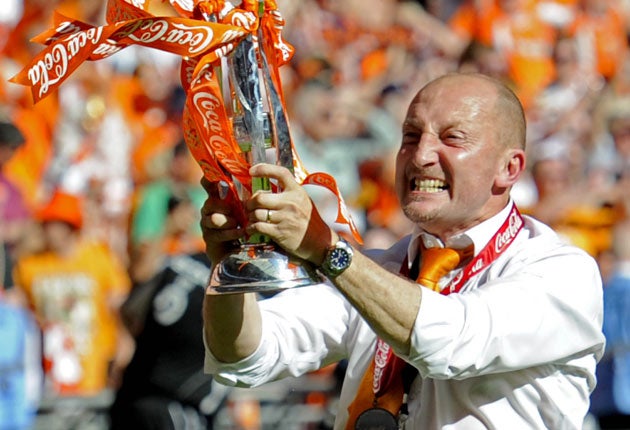Play-offs give smallest of clubs something massive to aim at

Your support helps us to tell the story
From reproductive rights to climate change to Big Tech, The Independent is on the ground when the story is developing. Whether it's investigating the financials of Elon Musk's pro-Trump PAC or producing our latest documentary, 'The A Word', which shines a light on the American women fighting for reproductive rights, we know how important it is to parse out the facts from the messaging.
At such a critical moment in US history, we need reporters on the ground. Your donation allows us to keep sending journalists to speak to both sides of the story.
The Independent is trusted by Americans across the entire political spectrum. And unlike many other quality news outlets, we choose not to lock Americans out of our reporting and analysis with paywalls. We believe quality journalism should be available to everyone, paid for by those who can afford it.
Your support makes all the difference.Gillingham, newly relegated to League Two, have just reappointed Andy Hessenthaler as manager with instructions to get the club back up to League One. But why stop there? Hessenthaler is not one for bold pronouncements and he knows if he declared his target was the Premier League he would be ridiculed, but managers and chairmen of every Football League club will have watched Saturday's Championship play-off final and wondered: Why not us?
It used to be only fallen giants, temporarily slumming it in the lower divisions – like Manchester City, Nottingham Forest and Leeds United – who fixed their gaze on the top flight. Now everyone should aspire to the elite. Successive play-offs at the new Wembley have promoted Premier League virgins: Hull City, Burnley, now Blackpool, each improbable guests at the top table.
Hull climbed three divisions in six years, Blackpool took 10 to make the same journey, but their ascent has been no less remarkable. The ground has only recently been enlarged to hold 12,000, the investment in players has been modest, and success can hardly have resulted from managerial stability when Ian Holloway is their fourth in seven years. The turnover reflects nine bottom-half finishes in the last dozen seasons. But on each occasion Blackpool have finished in the top-half they have been promoted. They are a club who have taken their chances.
The Seasiders will thus become the 44th club to have competed in a competition which is less than 20 years old. The Premier League is criticised for many things, but it is not a closed shop, not yet, and Blackpool's fairy tale underscores why the occasional moves towards pulling up the drawbridge must be resisted. The Tangerine dreamers bring romance and colour to the top flight, and offer hope to the lower orders.
Of course, next season will be a struggle and may end in relegation, but if Blackpool budget like Burnley, rather than Hull, the season should provide a platform for sustained progress, rather than provoke a looming catastrophe.
Footnote: A decade ago Blackpool and Cardiff were relegated together from the third tier; Gillingham, with Hessenthaler playing, were promoted from the same division after beating current Premier League clubs Stoke City and Wigan Athletic in the play-offs. In football stasis is rare – that is part of its allure.
Join our commenting forum
Join thought-provoking conversations, follow other Independent readers and see their replies
Comments